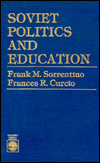

 |

|

The average rating for Soviet Politics and Education based on 2 reviews is 3 stars.
Review # 1 was written on 2016-12-26 00:00:00 Scott P Lee Scott P LeeThe state of education in India today concerns us all. The rote memorization of texts, the supremacy of the text book, the dictatorial role of the teacher in the classroom, the finality of the examination in deciding the worth of the student's achievement, the question of gender and caste, to the government led and delivered curriculum and many other challenges facing the education system in India - are all possibly symptoms or causes of our colonialist and nationalist past. Krishna Kumar in this book, Political Agenda of Education delves into India's past and analyses, brilliantly, the development of the modern education system. The book traces the roots of the education agenda in India from the beginning of the colonization of India to a nationalist revival and peels the various layers of political agendas that dictated the legacies that still linger on. A common view often heard in India blames the British of designing an education system that systemically produced clerks to support the British Empire in India. Krishna Kumar challenges this view and calls it theoretically feeble and historically untenable and launches an enquiry to understand why colonial education had the effects it had. In his analysis of early colonial educational enterprise, he describes the varied goals or aims that education was meant to achieve - from a pursuit of order to developing a moral agenda for the creation of a civil society under the British empire in India. Initial reports from British administrators offer interesting insight to understand the ideological roots of colonial education. Krishna Kumar says it was a complex idea, constituting elements of several different kinds - liberal-economic and political doctrines, paternalism and evangelicism. Another interesting insight that is offered is the relationship of the nationalist movement and its educational agenda (as promoted by Indian intellectuals and reformers) with that of the colonial agenda. Krishna Kumar states that the central theme of colonial discourse on education, of a morally superior teacher and a society whose character was in need of reform, was a contribution of both movements. He further states that the English education as a means of modern western knowledge suited the Indian intellectuals and leaders well, who were in search of an education discourse for India in the last quarter of the nineteenth century and that it reconfirmed the social distance between the masses and the upper caste families and bestowed upon them a moral superiority and a certain legitimacy. Krishna Kumar then begins an enquiry to the question: what is worth teaching and the context of the mid-nineteenth century choices made by the English administrators regarding the curriculum. He also closely examines the position of the teacher in the colonial education system and brings significant insight into some of the problems in education that we face today. The section begins with a historical understanding of the traditional education system, where the goals of schooling were significantly different from that of the modern colonial system as was the teachers' position. Drawing from various reports, Krishna Kumar establishes the goals of the Indian traditional education system, where the teaching was a specialized activity with the teacher having complete autonomy over the classroom, the curriculum and over each child's individual progress. He then contrasts it with the goals of the colonial education system and draws out the reasons for the change in the teacher's position as well as of a curriculum that was based of facts and rules and governed by inspectors and prescribed texts and examinations. In the second half of the book, Krishna Kumar analyses the dynamics of the freedom struggle and the quest in it for equality, self-identity and progress. The pursuit of these three value orientations, says Kumar, permit us to see how the prominent discourses on education combined discrete value positions to develop distinct configurations. For understanding these three complex non-mutual categories, Kumar looks at various efforts in the nationalist movement to understand the impact they had on education. He looks at Phule's struggle against Brahmanical dominance and Ambedkar's leadership in welding the cause of the oppressed castes to better understand the question of equality within the bourgeois-liberal framework. He also discusses issues of positive discrimination and girl's education to locate equality within the educational agenda for India. He goes on to further probe the quest for self identity and the role that education played in the revivalist streak of politics in the freedom struggle like the transformation of Hindi into a class dialect of the educated. He also looks at the term 'progress', defined in terms of industrialization and modernization as means of production. He argues however that the right of the state to define a secular 'national identity' did not succeed in an educational sense and that no attempt was made to alter the epistemological basis of colonial education. Lastly, in a telling way, Krishna Kumar concludes that after half a century of independence, cultural revivalism has resurfaced and that our modernized industrial base has served this revival. He warns us of this pursuit that he says has little patience for equality and justice and that the challenge to alter this equation still exists. This is an excellent book for understanding the connection between education and its political leverage. A must read for those helping shape a more vibrant education system revival. Reviewed by Parth Sarwate |
Review # 2 was written on 2018-06-14 00:00:00 Carlos Hirales Carlos HiralesThis is an insightful book on educational policies shapned by new colonical (western) thought and traditional brahmanical hegemony that existed in pre-colonial times. Krishna Kumar, as usual, lucid in his writing styles makes this an easy read for any one who wants to understand how our present education system came to be. |
CAN'T FIND WHAT YOU'RE LOOKING FOR? CLICK HERE!!!